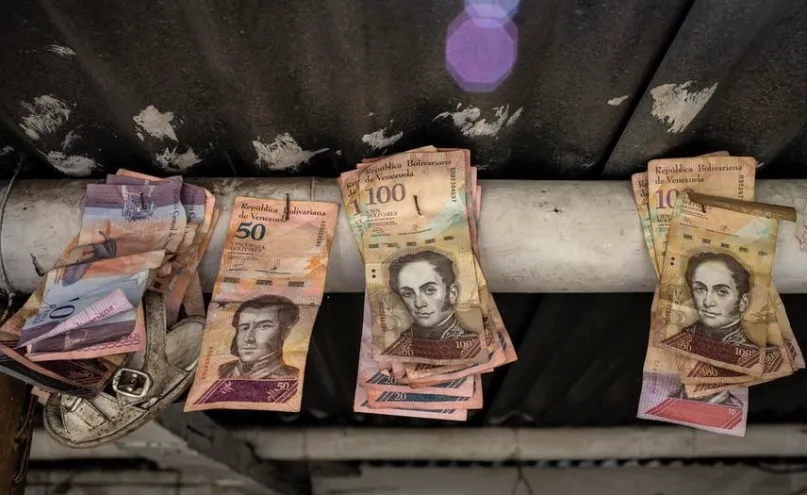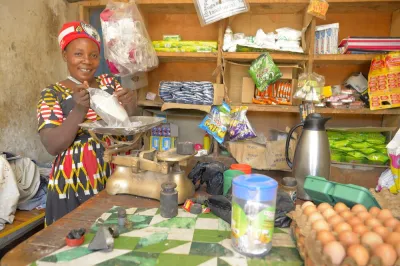Financial Inclusion for Refugees and Migrants in Latin America

With almost 20 million people in need of international protection, Latin America hosts one of the world's largest displacement crises. More than 6 million people – out of the 7 million who have left Venezuela in search of protection and a better life - have found shelter in Latin American and Caribbean countries. Colombia hosts one of the world’s largest populations of internally displaced persons, over 6.8 million and more than 2.4 million registered Venezuelan refugees and migrants. In addition, more than one million people from El Salvador, Guatemala and Honduras were forced to leave their homes and were hosted in neighboring countries in the region. The number of Nicaraguans seeking protection in the sub-region also continues to raise, especially in Costa Rica.
But financial services are key for accessing this pathway, and refugees and migrants often face barriers to getting the services they need.
To raise awareness and find solutions to the financial service needs of this population, UNHCR and IFC have been working to show the private sector the benefits of working with them. Here are five things we’ve learned that make a difference for advancing financial inclusion for refugees and migrants.
1. Stereotypes are an important barrier that can be addressed through face-to-face interactions
Creating opportunities for face-to-face interaction with refugees and migrants can help break down stereotypes and promote better understanding of their needs and potential. We found this to work well during our earlier work, when we organized workshops and meetings to bring together financial service providers (FSPs) and regulators with refugees and migrants in several cities in Peru, Ecuador, and Brazil. Many participants found the workshops to be "eye-opening,” and were impressed by the refugee entrepreneurs’ determination, resilience and entrepreneurial spirit - all characteristics of successful business owners.
After the workshops, several FSPs in the four countries decided to target refugees and Venezuelans, including Banco do Povo and Banco Perola in Brazil, Financiera Confianza in Peru, and Fundación Espoir in Ecuador. Lessons learned are also being shared through webinars run by IFC and UNHCR among the countries to encourage other FSPs to extend their financial products and services to this population.
2. Data is important to help overcome misconceptions about refugees and migrants and make the business case for serving them
IFC conducted two financial inclusion gap assessments in Colombia and Peru to sensitize the financial sector to the business potential of migrants and refugees who have settled in the two countries, with a particular focus on Venezuelans. The assessments revealed that, contrary to the perception that Venezuelan migrants and refugees are mobile and unstable, more than 90 percent of Venezuelans have lived in Colombia for over two years and 96 percent intend to stay in the country in the coming years. Similarly, in Peru, more than 70 percent of Venezuelan migrants have lived in Peru for over two years and 87 percent have reunited with their families.
The studies also helped combat the misconceptions that migrants do not have a stable source of income and only work informally. The unemployment rate of migrants in Colombia in 2022 was only 15 percent, compared to 14 percent for locals, and more than 2.5 million have regularized their migration status or are in the process of doing so. Additionally, Venezuelans tend to have a good familiarity with the use of financial services, especially digital ones, and insurance products.
3. Targeted investments and technical assistance can provide a final push to incentivize FSPs to serve refugees and migrants
IFC and UNHCR are working together to help FSPs reduce unconscious biases that may still exist among their staff in order to approach migrants and refugees with more empathy and sensitivity. Through its advisory services and investment instruments, IFC actively works with FSPs to improve their awareness and information about this population’s characteristics and financial needs, develop and test tailored offerings and enhance financing options.
IFC supported Bancamía, one of Colombia's leading microfinance banks to design and implement a value proposition for migrants and refugees which was in late 2021 to help Venezuelans in Colombia integrate into social and economic life. Under this program, Bancamía adapted their products, services, channels, processes, and procedures, for the migrant population, reaching more than 7,300 refugees and migrants. Encouraged by the data collected in the Colombia study, there are now several financial service providers interested in tapping into the market opportunities offered by refugees and migrants.
4. Refugees and migrants need guidance on accessing the financial system in their host country, while FSPs need guidance on how to approach migrants and refugees
To help migrants and refugees in Brazil understand how the national financial system works and how to conduct banking transactions, UNHCR worked with the Central Bank, the Ministry of Justice and Public Security and IOM to launch the Financial Information Booklet for Migrants and Refugees. We printed the first edition of the booklet which was distributed through our partners, while the online version was shared via digital channels and emails to the displaced population.
IFC and UNHCR also prepared a short guide for financial institutions, in collaboration with the Brazilian Banking Association and the Central Bank of Brazil, about the profile and specific documents of refugees and migrants and their financial needs.
The Brazilian guides served as a reference for a similar guide from Colombia on how to use the financial system, published by the Colombian Banking Association in collaboration with IFC, UNHCR and other partners. And now, the Peruvian Financial Sector Regulatory Authority, in collaboration with the Peruvian Office of Migration, has also launched a guide to inform financial institutions about the profiles and characteristics of migrants and refugees, as well as their migration status and identity documents. These guides are important to inform financial service providers about the existing rules on accepting different types of documents/identifications from migrants and refugees.
5. Passing supportive regulation is key for enabling financial inclusion of migrants and refugees
Finally, none of these actions can have an impact without an enabling regulatory environment to foster access to financial services for refugees and migrants. In each of the four countries where UNHCR and IFC are jointly working, important steps have been taken:
- Colombia: In 2021, Colombia announced that it would grant all Venezuelans residing in the country a 10-year Temporary Protection Status (TPS), which allows them to work and access healthcare and other essential services. The regularization process – consisting of migrant’s identification, biometric registration and the issuance and delivery of the TPS, supported by UNHCR, began in May 2021. Nearly 2.5 million Venezuelans have already completed the first stage of the process to obtain TPS, and of these, over 1.6 million Venezuelans now have TPS.
- Ecuador: At the end of 2020, the Political, Monetary and Financial Regulation Council adopted three resolutions that set out the requirements for opening a savings account for applicants for international protection. Applicants must present a document - either an identity card or passport from their country of origin and a humanitarian visa. Persons recognized as refugees or stateless persons can open a savings account if they present an Ecuadorian ID.
- Peru: Venezuelan asylum seekers here can be granted a humanitarian residence permit, valid for six months, which gives them access to the foreigners' ID, a key document for integration and access to social programs, including free public healthcare. Alternatively, citizens of all nationalities can apply for a temporary residence permit, valid for one year, which regulates their stay in the country and allows them to work.
- Brazil: In 2019, the National Committee for Refugees in Brazil (CONARE) allowed the application of the Cartagena Declaration to be applied to those entering from Venezuela. This led to a prima facie recognition of Venezuelans as refugees. More than 53,000 people from Venezuela have now been recognized as refugees in Brazil, making them the highest number of recognized Venezuelan refugees in a Latin America country.
The key aspects outlined in this blog can be well replicated and adapted to different contexts in which displaced persons are hosted. This requires a concerted effort to tackle the persistent barriers that are intrinsic to the enabling environment and the industry players. IFC and UNHCR are collaborating to address some of them, while also taking stock of the lessons learned resulted from their interventions.
Moreover, recognizing the growing importance of the private sector in promoting the economic integration of forcibly displaced people to the development of their host communities, IFC and UNHCR launched a joint initiative to institutionalize their collaboration and increase private sector engagement in creating markets in displacement contexts worldwide. Financial inclusion is a key component of the joint initiative, which will be addressed with gap assessments, joint advocacy, and tailored advisory & investment support for FSPs and other stakeholders to enable access to finance for forcibly displaced people.



I share the concern, which I also believe it is a great opportunity as described by your insights. Most of the migrants show resilience and commitment towards a better life, and only for that should have a 'better score credit'. And we have also great fintechs in the region that can help walk them to a successful entrepreneur journey, we just need to help them meet each other!
Leave a comment